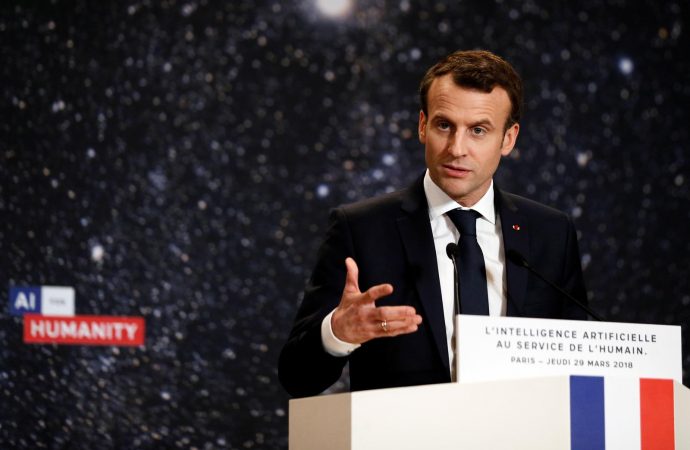French President Emmanuel Macron promised 1.5 billion euros ($1.85 billion) of public funding into artificial intelligence by 2022 in a bid to reverse a brain drain and catch up with the dominant U.S. and Chinese tech giants.
The investment is part of an AI strategy laid out by the centrist leader at the elite College de France research institute in Paris and builds on a report that points to the assets and drawbacks of France in the field.
Business-friendly Macron wants to turn France into a “start up nation” and bets that easing labor laws and higher investments technology will create jobs, alleviate the domination of Alphabet’s Google, Facebook and lay out the seeds for Europe-based champions.
“There’s no chance of controlling any effects (of these technologies) or having a say on any adverse effect if we’ve missed the start of the war,” the president said on Thursday in front of a row of ministers and top executives, including BNP Paribas Jean-Laurent Bonnafé.
He spoke between two black boards covered with complex equations in the main amphitheatre of the institute, founded in the 16th century.
The first goal is to make better use of the French higher education system that trains computer engineers and mathematicians only to see them leave for jobs at top U.S. tech companies.
Some of them have secured high-level positions Google and Facebook, and Facebook, which opened an AI research center in Paris in 2015.
“What a waste,” said Finance Minister Bruno Le Maire earlier on Thursday. “France pays for the training of doctoral students who then head to the United States.”
LADY GAGA OF MATHEMATICS
The AI plan was inspired by a government-commissioned report by Cedric Villani, the self-styled “Lady Gaga of Mathematics” and winner of the mathematics equivalent of the Nobel Prize.
Villani, who is also a lawmaker in Macron’s party, said in the report the brain drain to Silicon Valley companies showed the excellence of French schools and justified a doubling of their salaries — a proposal that was eventually left out.
The report also pointed to the need for greater collaboration between government research centers and private companies to keep the best minds at home, an idea that was praised by Macron and could lead an easing of the conditions needed for state researchers to work in for private companies.
Macron’s AI plan calls for the opening up of data collected by state-owned organizations such as France’s centralized healthcare system to drive up efficiency through AI — the field in computer science that aims to create machines able to perceive the environment and make decisions.
The amount to be spent, about $450 million, represents a drop in the ocean of AI spending worldwide, which consultancy firm McKinsey estimated between $20 and 30 billion for the biggest tech companies alone in 2016.
In a sign Macron’s efforts to woo top scientists and businesses may be starting to bear fruit, Samsung Electronics , Japan’s Fujitsu and London-based Google-owned DeepMind announced plans to beef up their operations in Paris earlier.
IBM also announced on Thursday its intentions to recruit 400 AI experts in France over the next two years.
Before unveiling his plan, Macron hosted a dinner with about a dozen AI experts at the Elysee palace.
Guests included Yann LeCun – the New York-based Frenchman who until recently ran Facebook’s AI research lab – and Demis Hassabis of London-based DeepMind, creator of the AlphaGo system that in 2016 beat an elite human player of the Chinese game “Go”.
Source: Reuters

































Leave a Comment
You must be logged in to post a comment.